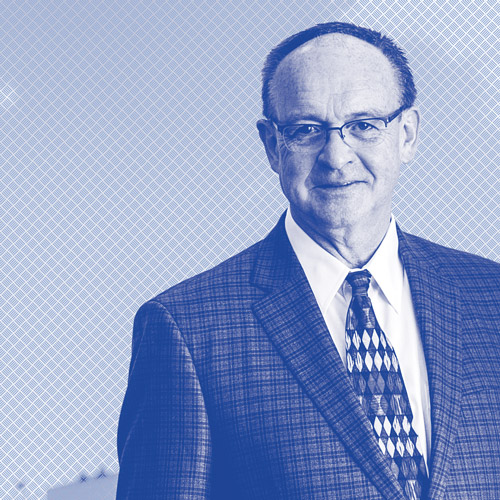Alana Newhook was made to be a lawyer for a professional hockey team. It’s not that it didn’t take gumption to get there, but the vice president and general counsel of the Dallas Stars, a National Hockey League franchise, is from Toronto—where the love of hockey is akin to a religion. Yet Newhook was more than just a fan; she also had serious chops on the ice. And the toughness she learned playing hockey continues to serve her well in the legal world.
By the time she started kindergarten, Newhook was battling her two older brothers and their friends in neighborhood games. After moving to Pennsylvania at the age of seven, she says her mom convinced the local league to let her play. “There wasn’t a girls’ team in our area, so I cut my hair short so it was not visible under the helmet and became the only girl on the boys’ hockey team.”
High school and college then brought the opportunity for her to play on an elite women’s hockey team. School also brought out her academic talents, which landed her at Southern Methodist University’s Dedman School of Law in Dallas, where hockey is almost never played outside of the indoor ice rink. While she was at the university, a light bulb went off: apply her sharp mind to promote the game she loves most. “I’ve always kept hockey close to me in my life, so I decided to try to figure out more about the business of hockey and of sports in general,” Newhook says. “All through law school, I was focused on figuring out how, as a lawyer, I could be involved in sports and add value to a team or franchise.”
Newhook soon realized that sports law “wasn’t really a thing,” as she says. Unlike corporate law, real estate law, or numerous other specializations, there is no preestablished track to become counsel for a sports organization. So Newhook, who describes herself as a “strategic planner and proactive person,” chose to blaze her own path. That’s when fate interceded.
“In the course of my research, I stumbled across and ordered a book on winning NHL franchises called Behind the Moves, which as it turned out was written by Jason Farris, the executive vice president of the Dallas Stars,” Newhook recalls. “A day later, I got an e-mail from him and we scheduled a time to connect to pick up the book.” Upon meeting, Newhook shared a bit about her background and career goals. She recalls that Farris was intrigued: he thought maybe her aspirations and his organization’s needs might align. In 2014, Newhook was brought on as the director of contract management, and last year, she became the head of the team’s legal department. Until recently, it was a department of one.
Working for the Dallas Stars was her second job out of law school. “They weren’t actually looking for a lawyer,” she says. “They relied entirely on outside counsel. But I was able to use my proactive efforts to meet Dallas Stars CEO Jim Lites and team owner Tom Gaglardi, and make my pitch. I said, ‘I would love to be part of your organization. Is there anything I can do?’”
A few months after joining the organization, Newhook faced her first major project. Dallas Stars leadership moved to acquire the Texas Stars, an American Hockey League (AHL) minor-league affiliate based in Cedar Park, Texas. She worked closely with Farris and Lites on the deal, which included taking over operation of the Cedar Park Center—the home of Texas Stars and a popular concert and event venue. For Newhook—then just two years out of law school—the experience was invaluable. “There were a lot of moving pieces,” she says. “It involved working with the AHL, negotiating with the City of Cedar Park, and various real estate components. It was a great opportunity for our organization to have synergy with the minor-league team and a wonderful experience for me as a lawyer.”
On the surface, the day-to-day responsibilities of in-house counsel at a sports organization differ little from most other corporate legal environments: business acquisitions, contract management, HR responsibilities, intellectual property matters, compliance, and risk assessment. Newhook looks after all of these areas as the Dallas Stars’ general counsel, and she engages outside counsel for litigation work. But Newhook says there are “unique overlays” for a sports organization lawyer, such as the NHL’s collective bargaining agreement. On the other hand, there’s a lot that goes into running a sports organization beyond just tending to the affairs of the team. For example, Newhook is responsible for the legal affairs of a Texas chain of youth ice hockey centers operated by the Dallas Stars.
“Every professional sports team has its own corporate structure, and many have other business areas that fall under the same ownership,” Newhook says. “I speak with a lot of young lawyers and law students, and they all want to know how to be a sports lawyer. My main advice is to focus on a variety of different legal fields if your client is in the sports business. Ultimately it is about applying your skill set and your legal training to the needs of a sports team.”
Of course, there are perks, to say the least, such as getting the opportunity to attend hockey games. But more importantly, Newhook says working for a sports organization means seeing the fruits of your labor make an impact on the thousands of fans who follow the team. Whether it’s negotiating contracts for the improvement of an arena or parsing intellectual property rights around the team logo and memorabilia, every move has a direct connection to the fans—who, by definition, are a jubilant and
appreciative audience.
“Being a fan myself, I understand the joy that they have when they come to see our players perform, and being able to augment that by using my legal skills in support of our business team is such a privilege,” she says. “It’s so fulfilling when I see fans wearing the team shirt that we worked so hard on or taking a picture with our mascot.”
Even with an abundance of responsibilities, Newhook knows she can handle whatever comes her way. “I grew up with two older brothers and a lot of their friends in the house, so being the only girl and being the youngest, it made me pretty tough. It takes quite a bit to overwhelm me,” she says. “Coming into this organization as a young attorney required that I be confident in my abilities to help find the best solution for the organization. But the challenges and the opportunities to overcome them are what makes me look forward to going to work each day. I think that’s a required personality trait for being an in-house counsel.”
Newhook adds that she doesn’t shy away from a challenge, and her leadership on and off the ice proves that. Now that the Dallas Stars legal team has just doubled in size with the hiring of a lawyer, Newhook is even more prepared to face off for the Dallas Stars.

